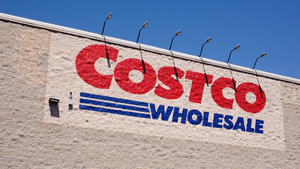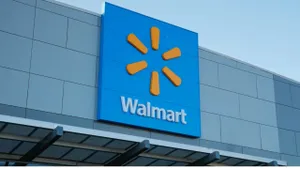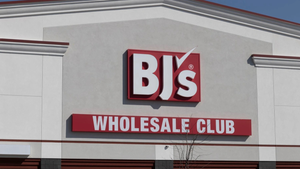PHONE CARDS RING TRUE FOR SUPERMARKETSPHONE CARDS RING TRUE FOR SUPERMARKETS
Prepaid phone card suppliers seem to agree on little, except that sales of the cards in supermarkets will continue to grow rapidly this year."Phone-card sales in supermarkets are going through the roof," said Don Jordan, national manager at Vocall, Mountainside, N.J., one of several suppliers polled at a recent trade show.But the suppliers differed on the benefits of point-of-sale activation, as well
June 28, 1999
DAN ALAIMO
Prepaid phone card suppliers seem to agree on little, except that sales of the cards in supermarkets will continue to grow rapidly this year.
"Phone-card sales in supermarkets are going through the roof," said Don Jordan, national manager at Vocall, Mountainside, N.J., one of several suppliers polled at a recent trade show.
But the suppliers differed on the benefits of point-of-sale activation, as well as on customizing cards for retailers. "There are a number of retailers that are very happy with POS activation. But we have others where POS wasn't right for them," noted Mark Evans, marketing and sales vice president at AT&T Prepaid Services, Basking Ridge, N.J. "We work very hard to determine the best solutions for each of our retail customers."
On one side of the activation controversy is Cheryl Jensen, executive director of U.S. South Communications, Atlanta. She said, "Supermarket sales of phone cards will increase dramatically now that we have found a way to allow retailers to have inventory at no cost and activate cards at POS, thereby reducing theft."
On the other side is Jordan, who noted, "We haven't done a lot with POS activation, because we find that it's not always needed. There's no more of a security issue with phone cards than any other type of product in their store."
Some, like Jeffrey Hicks, Midwest regional sales manager at Atcall, Vienna, Va., advocated that retailers put their own name on the cards. "The co-branded private-label card is basically a walking billboard for the supermarket," he said.
On the other hand, Tom Murphy, director of CSG prepaid card sales at Sprint, Overland Park, Kan., noted that the national brand could be a more important sales tool. "On customized cards, some retailers are interested in promoting their brand name, while other retailers are more interested in the strength of a brand name like Sprint."
Here is what the suppliers said about phone card sales in supermarkets:
Jeffrey Hicks
Midwest
regional sales manager
Atcall
Vienna, Va.
Phone card sales will definitely increase this year in the supermarket chains, because they are becoming more widely recognized and more accessible. The consumer is starting to become aware of the advantages and conveniences of prepaid phone cards. The shrink issues are being addressed. We at Atcall are addressing them through our POS-activation system, where we program the existing swipe credit-card terminals to accept our card. If someone were to steal the card, they would get nothing but a piece of plastic. So the chances of theft are greatly reduced.
The co-branded private-label card is basically a walking billboard for the supermarket. When people use it, they know where they got the card. If retailers want to do a co-branded card with Atcall on it, that's fine with us. We can supply generic cards, too. But what's a better way to promote your stores than if you have something with your name on it? The customer looks at that and they understand Wegmans, for example. That's where they buy their groceries, so they relate to it.
Mark Evans
marketing and sales
vice president
AT&T Prepaid Services
Basking Ridge, N.J.
The prepaid-card industry continues to grow aggressively, which is great news for retailers and for vendors. We continue to see increasing sophistication of merchandising, marketing and promotions -- the types of things retailers do to generate sell-through.
One technological change that we're seeing is an increased focus on POS activation, and we've been very actively talking about it with many of our customers to see if it's right for them in their particular environment, especially in terms of ease of execution.
As prepaid cards have become popular, now it's an issue of how do we maximize the merchandising, the marketing, the impact to the customer -- and make the product top-of-mind. That's why we're seeing a lot more marketing and merchandising and efforts like POS activation -- to get the product out of the cash drawers and onto the shelves.
There are a number of retailers that are very happy with POS activation. But we have others where it may not be the best solution for them. The value of POS activation also varies by channel -- it may work in the grocery-store channel, but in some convenience stores, for example, it may not make sense.
Barry Strom
president
Communications Design Group
(exclusive agent for Southern New England Bell Prepaid Phone Cards)
Stamford, Conn.
There's been a lot of downward pressure on pricing of prepaid phone cards. There are a lot of companies driving that trend to lower pricing. In some cases, they are not companies of substance, and, unfortunately, the consumer has paid the price for plastic cards that don't work. The value we offer is we market a product with the Bell logo, owned by a 120-year-old telephone company, and I think that we'll see in 1999 the return to some credible-source requirement. That has not been as important to the consumer as to the retailer. The retailer is the one who gets burned when he has to make good to the consumer, so the retailers will be more cautious about what they are buying.
On the shrink concerns of supermarket retailers, there's point-of-sale activation, which I don't think addresses it -- but it slows down the transaction at the register, which is not good. We've been using vending machines extensively, and then as a blister pack we have a package that is empty. The actual product is identical and is exchanged from the cash drawer.
A successful phone-card program for supermarkets is a dignified product from a recognized source, a price that's competitive, a good value and a reliable product. Competitive pricing is moving. There are 10-cent products that carry a $1 first-minute surcharge. That's not a good value, and it's more expensive than the 25-cent product. In general, a 25-cent product without a surcharge is a fair value, and a 19-cent product is a very good value.
Tom Holihan
brand manager
MCI WorldCom
Alpharetta, Ga.
Phone-card sales in supermarkets are going to increase. The market has grown really quickly since 1992, but we had a core user who was a fairly distinct subsegment of the population. We are now beginning to broaden the overall market to more of the mainstream consumers. As we see wholesale and retail home rates become more competitive, people who never thought prepaid made sense for them will begin to realize its benefits. They will begin to not only utilize prepaid cards as an adjunct to their long-distance service, but also as an adjunct to their traditional phone credit cards.
Most of our major customers and distributors have host-to-host POS-activation systems. We've been working on trying to come up with a very workable, very efficient and cost-effective, and more or less ubiquitous POS-activation system. We hope to roll it out during the middle of the year. But the overall category of POS activation or pay-on-scan will become more the norm than the exception over the next 12 months.
That will help sales in supermarkets, because most supermarkets now, if they have a program, have a cash-drawer or service-desk program. But if you don't merchandise prepaid cards, you're not going to sell them. So POS activation will allow retailers to merchandise at the checkout like any traditional category.
On customized cards, we're very interested in building the MCI WorldCom brand for prepaid. However, there are a number of accounts, like major supermarkets, that have quite a bit of brand equity on their own, whether on a local or a national level. So if that particular supermarket thinks it makes sense for them, we are very much involved in the co-brand or the private-label business.
Cheryl Jensen
executive director
U.S. South Communications
Atlanta
Supermarket sales of phone cards will increase dramatically now that we have found a way to allow retailers to have inventory at no cost and activate cards at POS, thereby reducing theft. We now have the technology to use retailers' existing Visa activation system, which does not require an another phone line or take up additional space, which is at a premium in retail locations.
Shrink has been a big issue for retailers. Typically the way we have been activating cards is via fax or when they get to the store's location; and then they are holding live inventory, which is a cost to them. So this reduces that cost as well.
There has been some resistance to the cards because of concerns about theft and inventory costs. But with this new technology we have eliminated all of those concerns, and we will be able to sell more cards with a lot less worry and increased profit.
Tom Murphy
director of CSG
prepaid-card sales
Sprint Overland Park, Kan.
Grocery stores are going to continue to emphasize this product. It is one of the higher-ticket items they have to sell. With the kind of margins they can make on it, they are finding creative ways to make the product available to the consumer. For example, with the redeem-at-cashier program, replicas of cards are merchandised and traded for "live" cards stocked at the register. With POS-activation technology, such as Sprint's instant activation, the card can also be merchandised openly with a reduced risk of theft. With instant activation, the card will have no value until the retail clerk swipes the card through the register equipment.
Benefits of the instant-activation system include shrinkage reduction, improved merchandising, increased cash-flow from consignment billing, ability to set expiration dates at the time of purchase, and automatic reorder of inventory.
On customized cards, some retailers are interested in promoting their brand name, while other retailers are more interested in the strength of a brand name like Sprint. They appreciate the value that we have built into our product, and they're comfortable selling that. But there is no question that some retailers want to merchandise their brand name, and we've seen some growth in that area.
Don Jordan
national manager
Vocall
Mountainside, N.J.
Phone-card sales in supermarkets are going through the roof. We've seen tremendous growth in the overall acceptance in the United States of phone cards. People are finding that it is the way to make calls from a pay phone. In some cases, we know of people who have shut their long-distance service off at home as a way of controlling spending and use prepaid calling cards instead.
We haven't done a lot with POS activation, because we find that it's not always needed. I think there's an over-exaggeration of the need for it. For example, when a supermarket sells batteries, you don't have to charge the batteries up before a person buys them. There's no more of a security issue with phone cards than any other type of product in their store.
Success in selling phone cards in supermarkets really boils down to service -- the cards have to work. It doesn't matter if they're advertised at a low rate if there are all kinds of problems when the consumer goes to use them. A key factor is rate. We are currently at 10 cents a minute. The rates have been falling over the past three years, from 19 to 14 and down to 10 cents a minute.
Supermarkets should look at phone cards as a promotional tool. It's a more than $2 billion dollar a year business, so it's obvious that people love phone cards and are buying them. Maybe supermarkets could look at using phone cards as a promotional incentive for frequent shoppers and tie them in with their club cards. For example, they could offer shoppers 20 free minutes with every $100 of groceries.
About the Author
You May Also Like




